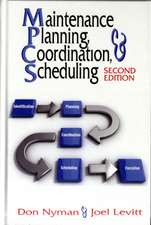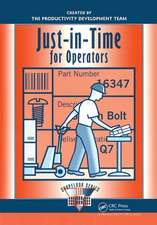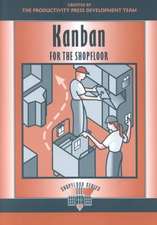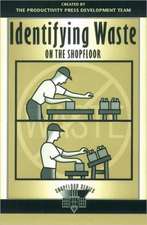The Front End of Innovation in Converging Industries: The Case of Nutraceuticals and Functional Foods: Betriebswirtschaftliche Studien in forschungsintensiven Industrien
Autor Stefanie Bröring Cuvânt înainte de Jens Lekeren Limba Engleză Paperback – 25 noi 2005
Preț: 388.90 lei
Nou
Puncte Express: 583
Preț estimativ în valută:
74.41€ • 77.70$ • 61.45£
74.41€ • 77.70$ • 61.45£
Carte tipărită la comandă
Livrare economică 15-29 aprilie
Preluare comenzi: 021 569.72.76
Specificații
ISBN-13: 9783835000742
ISBN-10: 3835000748
Pagini: 364
Ilustrații: XX, 342 p. 125 illus.
Dimensiuni: 148 x 210 x 24 mm
Greutate: 0.44 kg
Ediția:2005
Editura: Deutscher Universitätsverlag
Colecția Deutscher Universitätsverlag
Seria Betriebswirtschaftliche Studien in forschungsintensiven Industrien
Locul publicării:Wiesbaden, Germany
ISBN-10: 3835000748
Pagini: 364
Ilustrații: XX, 342 p. 125 illus.
Dimensiuni: 148 x 210 x 24 mm
Greutate: 0.44 kg
Ediția:2005
Editura: Deutscher Universitätsverlag
Colecția Deutscher Universitätsverlag
Seria Betriebswirtschaftliche Studien in forschungsintensiven Industrien
Locul publicării:Wiesbaden, Germany
Public țintă
ResearchCuprins
1 Introduction.- 1.1 Research problem.- 1.2 Research question and objectives.- 1.3 Research strategy and method.- 1.4 Outline of the thesis.- 2 Innovation, innovation process and the front end of innovation.- 2.1 Definitions, classifications and situations for innovation management.- 2.2 Dimensions of innovation.- 2.3 Literature review of process models of the front end of innovation.- 2.4 The front end — idea generation.- 2.5 The front end — idea evaluation and selection.- 2.6 Critical review of the extant literature of the front end of innovation.- 3 Industry convergence as a context for the front end of innovation.- 3.1 Industry convergence.- 3.2 Patterns of industry convergence.- 3.3 Industry convergence — a particular context for the front end of innovation.- 4 Conceptual framework and research design to assess the front end in converging industries.- 4.1 Conceptual framework: reasoning and theoretical basis.- 4.2 Empirical research: methods and data collection.- 5 Empirical analysis of the front end in converging industries.- 5.1 Industry convergence — the case of the emerging NFF-sector.- 5.2 The sample — description and identification of different project types.- 5.3 Qualitative data analysis of the front end in converging industries.- 5.4 Quantitative data analysis of the front end in converging industries.- 5.5 Overview on empirical findings and Hypotheses building.- 6 Discussion of findings and implications for theory and practise.- 6.1 Discussion of R&D project types and implications for the RBV-theory.- 6.2 Discussion of type-specific front end decision making and implications for innovation management research.- 6.3 Managerial implications for the front end in general and for the NFF-sector.- 7 Conclusion.- Appendices.- References.
Notă biografică
Dr. Stefanie Bröring promovierte bei Prof. Dr. Jens Leker am Institut für betriebswirtschaftliches Management im Fachbereich Chemie und Pharmazie der Universität Münser. Sie ist Projektmanagerin im Bereich Business Ventures der Creavis Technologies & Innovation bei der Degussa AG in Marl.
Textul de pe ultima copertă
Industry convergence - the blurring of boundaries between formerly separated industry sectors - is a current phenomenon with vast implications for the front end of innovation. Firms intending to develop so called hybrid products face resource and competence gaps. Existing processes of idea generation and evaluation become obsolete since new areas of technological and market knowledge evolve outside traditional industry boundaries.
Stefanie Bröring analyses different project types, innovation strategies and front end decision making approaches in the converging sector of nutraceuticals and functional foods which is developing at the border of the pharmaceutical and the food industry. Results are derived from an empirical sample of 54 R&D projects collected in a North American industry cluster. The author shows that front end decision making in times of industry convergence is challenged by internal rigidities resulting from path dependency and describes how to successfully approach the front of innovation in times of convergence.
Stefanie Bröring analyses different project types, innovation strategies and front end decision making approaches in the converging sector of nutraceuticals and functional foods which is developing at the border of the pharmaceutical and the food industry. Results are derived from an empirical sample of 54 R&D projects collected in a North American industry cluster. The author shows that front end decision making in times of industry convergence is challenged by internal rigidities resulting from path dependency and describes how to successfully approach the front of innovation in times of convergence.



























